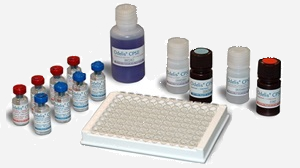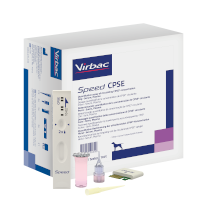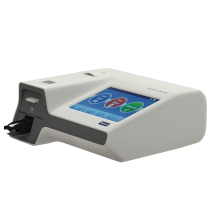
ELISA
Odelis CPSE
ELISA test kit for the Canine Prostate Specific Esterase (CPSE) dosage in unneutered male dogs.
Odelis CPSE is an ELISA (Enzyme-Linked ImmunoSorbent Assay) test kit for the quantitative determination of CPSE (Canine Prostate Specific Esterase) for veterinary laboratories.
-
Blood levels of CPSE (Canine Prostatic Specific Esterase) in dogs increase in the presence of Benign Prostatic Hyperplasia.
-
A CPSE assay can be used to detect asymptomatic prostate disorders, and to assess the need for appropriate treatment.
-
The ELISA (Enzyme-Linked ImmunoSorbent Assay) technology of ODELIS CPSE is a laboratory reference method that provides veterinarians with a precise and reliable quantitative assay.
For veterinary use only.
Product specification
|
Methode |
ELISA Immunoassay on microplate |
|
Sample |
Serum or heparinate plasma |
|
Target species |
Dog |
|
Handling time |
2 heures |
|
Reading |
10 minutes |
|
Storage |
Storage 18 months between +2 et +8°C |
|
Presentation |
Kit contains a 96 wells microplate + reagents |
Why perform Odelis CPSE ?
With age, and under the effect of impregnation by male hormones, the dog's prostate may be subject to the development of spontaneous disorders. The most frequently encountered condition in the whole male dog is Benign Prostatic Hyperplasia or BPH, corresponding to an increase in the number and size of cells in the organ. As early as 5 years of age, some dogs may present early histological lesions. (2)
Prostate enlargement is progressive and continuous. Excessive prostate size can lead to compression of the surrounding pelvic organs, resulting in painful and uncomfortable symptoms for the animal: constipation, tenesmus, dysuria, hematuria, lameness (compression of intra-pelvic nerve roots)...(3)
Benign prostatic hyperplasia in dogs can predispose them to more serious conditions, such as prostatitis, large prostatic cysts or prostatic abscesses. (4)
CPSE (Canine Prostatic Specific arginie Esterase) is a hormone secreted by prostate cells, under the control of androgens. This protein is normally present in semen (representing over 90% of the proteins in prostatic fluid).
In prostatic cell hyperplasia, serum CPSE level rises, making it an excellent early marker of BPH (5).
Quand proposer Odelis CPSE ?
Odelis CPSE enables the dosage of dog's CPSE concentration in the blood, helping to confirm or refute a diagnosis of Benign Prostatic Hyperplasia, so that treatment can be adapted rapidly.
In dogs over 5 years of age, a CPSE assay in the laboratory enables simple, early detection of Benign Prostatic Hyperplasia.
Odelis CPSE is a simple, reliable alternative to the rectal examination, which can be a painful experience for both pet and owner.
Odelis CPSE enables the practitioner to justify further examinations to rule out any concomitant disease (cysts, abscesses, prostatitis, etc.).
Quick guide
Please refer to the test instructions included with Odelis CPSE ELISA kits.
Odelis CPSE performances
| Sensitivity | 0,39 ng/mL |
|---|---|
| CV intra-assay | < 3,1% |
| CV inter-assay | < 6,6% |
| Threshold for BPH diagnostic | 61 ng/mL |
| Sensitivity at the threshold | 97,1% |
| Specificity at the threshold | 92,7% |
References
(1) Lévy X., Mimouni P., Fontbonne A., Derre G., Claret E.,Audhuy S., Morlet J.Performance evaluation of the new blood test Odelis CPSETM in the diagnosis of Benign Prostatic Hyperplasia (BPH) in dogs. In. Prodeeding of the 6th EVSSAR Annual Symposium, Wroclaw 2009 - Poland
(2) Barsanti J. Canine prostatic disease. in Proceedings of the International SCIVAC Congress, Rimini 2008- Italy
(3) Vesrtegen J. Managment of prostatic disorders . In : Proceedings of the International WSAVA Congress, Granada 2002- Spain
(4) Johnston SD, Kustritz MVR, Olson PNS. Benign prostatic hypertrophy/hyperplasia. In : Canine and feline theriogenology. WB Saunders, Philadelphia. 2001 : 340-341
(5) Bell FW, Klausner JS, Hayden DW et coll. Evaluation of serum and seminal plasma markers in the diagnosis of canine prostatic disorders. J Vet Intern Med. 1995 ; 9 ; 149-153




